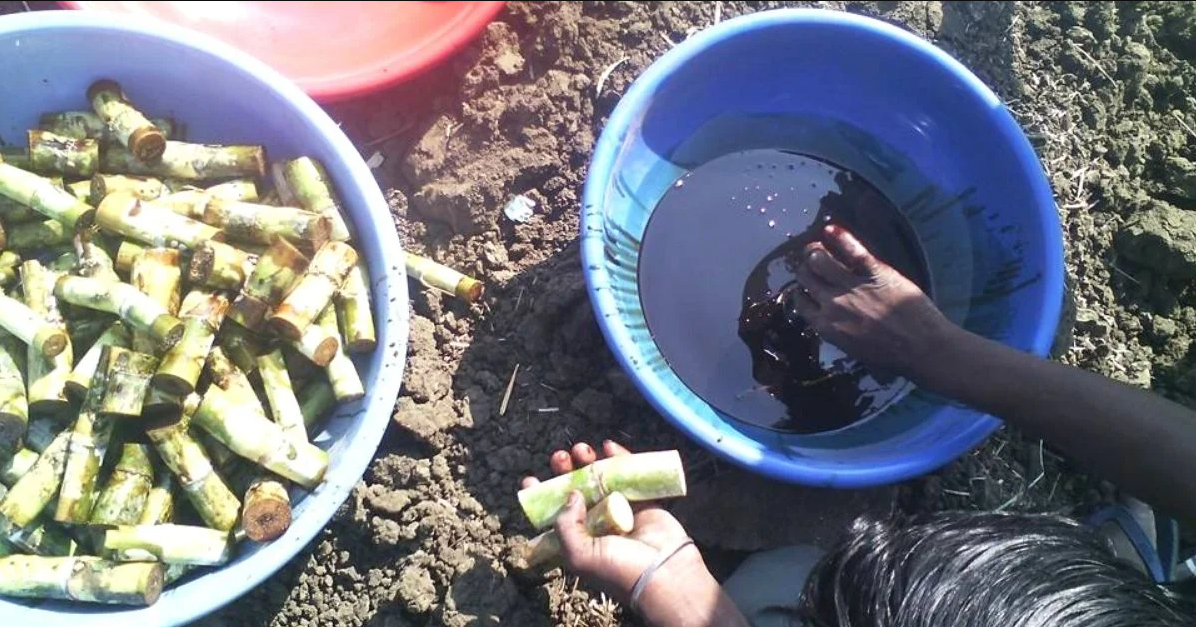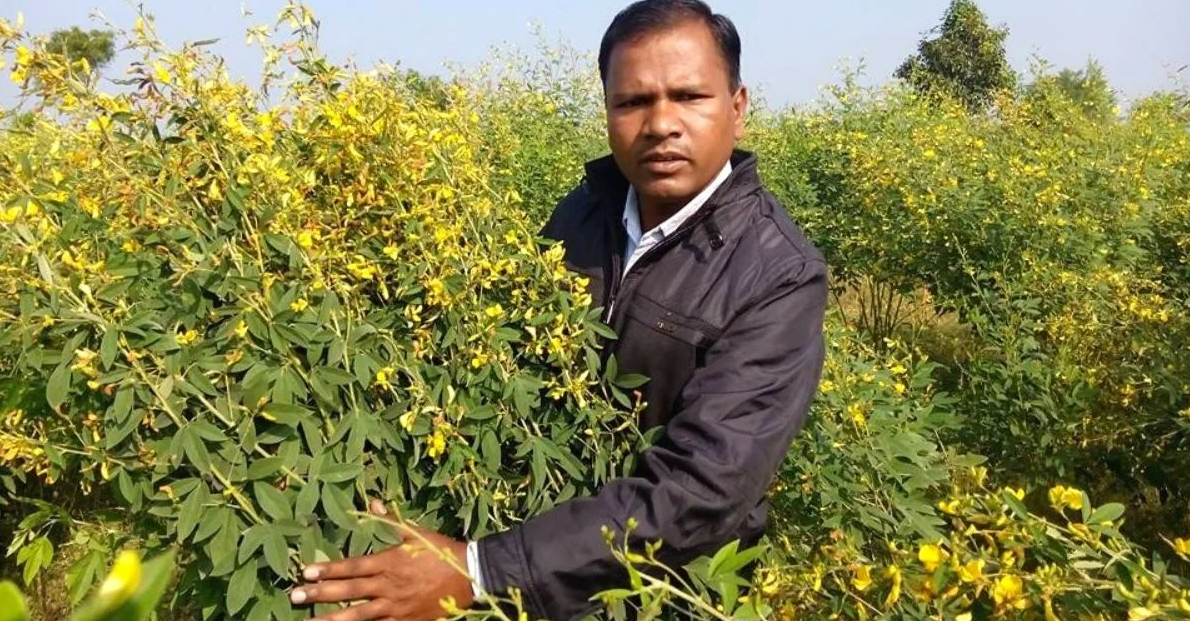In Kanai village in Madhya Pradesh, Tarachand Belji used to grow paddy and other traditional crops on his 6-acre land. His father would mainly farm using chemical fertilisers and pesticides.
But in early 2000, working with others on the farm, alongside media reports helped Tarachand realise the harm that the heavy use of chemicals had on farms, soil fertility and human health.
So Tarachand decided to join Krishi Vigyan Kendra in 2005 to learn about organic farming and became acquainted with Nanaji Deshmukh. Nanaji is a 2019 Bharat Ratna awardee who was honoured for his contributions to social and rural reforms.
Speaking with The Better India, Tarachand says he was impressed with the concept of growing food without the use of chemicals. “I worked in three villages of Sanai, located in Madhya Pradesh, as well as the Chitrakoot district of Uttar Pradesh, and learned all aspects of organic farming under Nanaji’s guidance for three years. I spent a considerable time in the library reading about natural farming practices and their benefits to the soil, and implemented the knowledge by working on a small land, and later expanding to a larger area,” he says.
Today, his learnings and innovative techniques are benefiting thousands of farmers, both across India as well as abroad.
Making the right switch
Tarachand Belji organic farmer
Tarachand demonstrating making of organic fertiliser.
The 41-year-old says that Nanaji insisted that young farmers should work towards benefiting the community at large. “I felt that organic farming could help address multiple issues such as human health, poverty and unemployment prevalent among farmers. Hence, acting upon the suggestion, I moved to Narsinghpur in 2009 to my in-laws’ home to start organic farming,” Tarachand says.
The same year, he established Prakritik Kheti Shodh Sansthan, aiming to reach farmers in the neighbouring areas of Seoni, Balaghat and Mandla districts.
“In three years, I established multiple organic farming models in villages including Zari, Bhatni, Khamariya and Dhodar. By 2010, I leased a 13-acre land and started growing unconventional crops such as mustard, wheat, green peas, lentils and guava using organic methods,” he adds.
Tarachand says he spent the next four years pursuing farmers and demonstrating the benefits of organic methods. “I explained to them the monetary and health benefits of these methods, alongside how the additional costs of fertilisers and chemicals are reduced,” he says.
Convinced by his success, 100 farmers became a part of his initiative.
Tarachand says the farmers who adopted organic farming techniques started seeing results. “My role evolved to become a trainer and a lecturer at GB Pant University of Agriculture and Technology at Pantnagar in Uttarakhand,” he says, adding that he started reaching out to farmers from other states, helping them convert to toxin-free farming.
Today, Tarachand has helped farmers across 19 states in India, as well as some areas as in Nepal, convert to organic farming. “I have conducted over 200 workshops and reached thousands of farmers to work towards improving the quality of soil and harvest,” he says, adding that at times he receives queries from Pakistan, Bangladesh and Canada as well.
Tarachand Belji organic farmer
Sugarcane treated wth organic mix before plantation.

“Viewers on my YouTube channel also approach me with their doubts and questions,” he says.
From years of experimentation, Tarachand also developed various types of organic fertilisers suitable for different crops. “The crops require certain nutrients in specific amounts, similar to the way calories work for the human body. I identified 70 items such as jaggery, white salt, sugar, fruits, fodder, coconut shell and charcoal. The organic material, mixed with cow dung and other farm residues, help improve production,” he says.
Tarachand says that unlike other organic fertilisers that often emit a foul smell, his composition eliminates odour and boosts the growth of micronutrients. “I have found five methods to produce organic fertilisers. Using the materials helps soften the texture of soil and makes it easy to plough to grow different varieties of crops,” he says.
‘Nature has it all’
Vinay Thakur, a farmer from Fular village in Madhya Pradesh, says that he switched from chemical farming to organic in 2016, thanks to Tarachand. “I attended a three-day workshop he conducted and adopted his formulae and suggestions, which have really benefited me,” he says.
Explaining his journey, Vinay says he suffered losses in the first year as he made a direct switch in the method. “However, the soil fertility improved over the months, and by the second year, I almost reached average yield that was at par with the chemical farming methods. Eventually, the harvest and production stabilised,” he adds.
He says shifting to organic methods showed evident results from the harvest quality. “The green peas I produced earlier using chemical farming methods were bitter. However, the organic methods improved their taste towards a sweeter side. The size of the pods also increased,” he adds.
Vinay says his profits have increased by 30 per cent. “As farmers, I believe we have a pious job of feeding people and hence, we should not feed chemical poison to consumers,” he says.
Tarachand Belji organic farmer
Vinay at his farm.

Amit Patidar, another farmer from Bhopal, has also benefited from Tarachand’s methods. “My family used to adopt a mix of chemical and organic methods in farming. However, adopting a systematic approach and intercropping methods as suggested by Tarachand have helped reduce pests and fungus infection in the soil,” he says.
Tarachand says his farmer group has reached up to 2,000 members over the years. In October 2019, they collectively formed a Farmer Producer Organisation, Raah Crop Producer Company, which has earned a turnover of Rs 40 lakh in 1.5 years.
During the COVID-19 lockdown, Tarachand also started a new initiative to help farmers grow red and black rice varieties that have high amounts of antioxidants and iron, low fat and are beneficial for diabetic patients. “The unique variety helped them increase income and survive the economic crisis when the overall market was underperforming,” he says.
Tarachand notes, “The soil naturally has all elements and nutrients – nitrogen, phosphorus and more – needed to grow healthy crops. The microbes are capable of protecting the plants. There is no need for a farmer to add artificial elements to increase agriculture produce, but only implement natural methods to add to his benefit.”
For queries or further information, you contact Tarachand on 7000020907.

